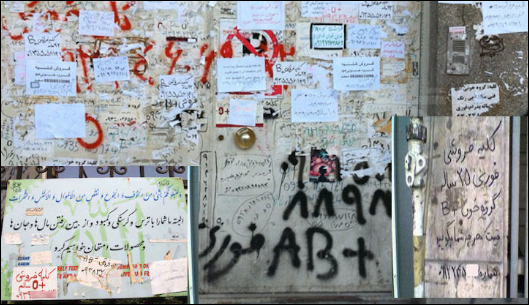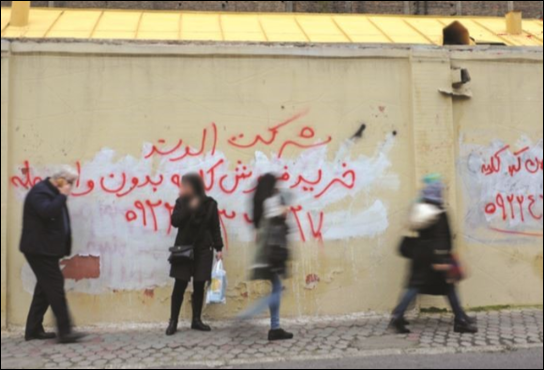A report released Thursday by an Iranian opposition group exposes the burgeoning human organ trade operating in the Islamic Republic of Iran, where desperate sellers regularly post public ads for everything from kidneys to livers, lungs, bone marrow, corneas, blood plasma and other body parts.
 The Foreign Affairs Committee of the National Council of Resistance of Iran, an opposition group operating out of Albania, issued the report “Selling body parts: a tragedy in Iran” to highlight how the country’s high cost of living and widespread poverty is leading many to take drastic measures to survive.
The Foreign Affairs Committee of the National Council of Resistance of Iran, an opposition group operating out of Albania, issued the report “Selling body parts: a tragedy in Iran” to highlight how the country’s high cost of living and widespread poverty is leading many to take drastic measures to survive.
“In Tehran, Farhang Hosseini Alley (central Tehran) is known as Kidney Street. The central building of the Association of Support for Kidney patients is located in the middle of this alley,” according to the report.
“In previous years (organ advertisements) filled all sides of the alley. Tags full of cell phone numbers were placed all over the walls. … Some people had written their message on the wall or on a sheet of paper with a pen or marker. Some had painted their ads on the wall. The message of all the murals on this street’s buildings was the same: sales and purchasing ads for kidneys, livers and even corneas,” the Resistance reports. “The phone numbers and blood types of the sellers were also mentioned in the ads.”
More recently, the ads have evolved into bold lines with sharp colors, and now include larger advertisements from companies looking to connect doners with patients in need.
Advertisements are now also common online, where folks list their sex, age, blood type and organs offered for sale. The average market price in 2018 for kidneys ranged between $5,000 and $10,000, while the going rate for livers ranged between $15,000 and $50,000, depending on a variety of factors, including the health and urgency of the sellers and patients.
The market price for corneas was about $20,000 in 2018, while bone marrow cost about $10,000.
Most of the people advertising their organs are young and desperate.
The Resistance report cites several advertisements posted online in September 2019.
“Hello. I am 28. I run our family,” Seyed Morteza posted. “For the sickness of my mother, for what I owe, I want to sell my kidney. I am an athlete and totally healthy. I sell immediately.”
“Hello I am Omid. Willing to sell part of my liver, my kidney and bone marrow on agreed price. It is urgent, urgent. If it is not done quickly, I will go to jail,” Omid wrote.
The report also points to Iranian regime officials who have supported and encouraged the unscrupulous organ trade, which now involves brokers who collect a 50 percent commission on the back alley deals.
“There is nothing wrong when a person who lives in poverty, and by receiving 200 to 300 million rials ($2,000 to $3,000 at the time) transforms his life,” Hossein Ali Shahriari, a member of the Health Commission of the Majlis (parliament) told the state run newspaper Mashregh in 2017.
“Based on Sharia, organ transplant is not a problem and is permissible, and his holiness Imam (Khomeini) gave the authorization for and the grand clerics are not opposed to it,” he said.
Shahriari countered critics from other countries who claim Iran’s organ trade is inhumane, according to the Resistance report.
“How is it not immoral when they kill humans and children?” he said. “Bombing women and old men and women is not inhumane?”
The report highlighted several cases reported in state-run newspapers that illustrated that many folks selling their organs are in desperate situations, from family members facing life-threatening illnesses to threats of homelessness.
One man who spoke with Shafa Online in 2018 told the news site his insurance doesn’t cover his child’s rare disease, and he was willing “to sell my heart to keep my child healthy” with continued treatments.
Another told the state run Hamshahri newspaper in January that “financial problems and the addiction and illness of family members have made me reach to the bottom of the line and so I want to sell my kidney.”
“If I can’t afford to pay for my family, the landlord will throw our belongings in the street,” he said. “I am not asking a high price. Do you think 200 million rials ($2,000) is too much for a kidney?”
The Resistance report concludes the shady market for human body parts in Iran is one of numerous symptoms of a country that’s rife with embezzlement, theft and “astronomical pillaging” of natural resources under the current Supreme Leader Ali Khamenei.
“The lion’s share of the Iranian nation’s wealth has been plundered by the Supreme Leader Ali Khamenei, his office and the Islamic Revolutionary Guard Corps. Khamenei’s personal wealth is reported to be around $200 billion,” according to the report.
“The Iranian regime’s leaders have devoted most of these resources to suppression at home and export of terrorism as well as arming, training and financing terrorist groups, fomenting proxy wars in the Middle East and working to obtain weapons of mass destruction,” the Resistance reports. “This is while the vast majority of the Iranian people live below the poverty line with no prospects for improvement in their daily life.”
Leave a Comment
COMMENTS POLICY: We have no tolerance for messages of violence, racism, vulgarity, obscenity or other such discourteous behavior. Thank you for contributing to a respectful and useful online dialogue.